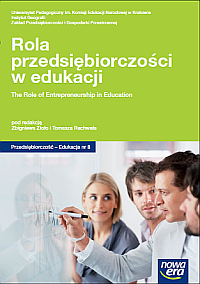Wiedza dziś – sukces jutro. Przedsiębiorczość w strategii rozwoju edukacji w Polsce.
DOI:
https://doi.org/10.24917/20833296.8.6Słowa kluczowe:
Przedsiębiorczość, edukacja, PolskaAbstrakt
The first part of this paper discusses the reasons of introducing the “Business studies” subject into the Polish education system. It refers, among other things, to Recommendations of the European Parliament and the Council in which the entrepreneurship is listed as one of eight key competencies that can be acquired during life-long learning process. The paper emphasises specific conditions related to economic changes in Poland and lack of tradition of bringing teenagers up in the spirit of entrepreneurship. The data quoted has shown how important is to increase the economic awareness of young Poles and to stimulate entrepreneurial attitudes among students from the point of view of an individual, the society and the country. The second part contains observations on methods that can be applied when teaching business studies subject during classes and extracurricular activities in post-secondary school. At last, the examples of the most interesting projects and the most important achievements of students engaged in activities of School Entrepreneurship Club in the 2nd Upper Secondary School in Nowy Sącz are presented.
Bibliografia
Banach Cz., Skarb ukryty w edukacji. Strategia rozwoju edukacji w Polsce do roku 2020, http://www.up.krakow.pl/konspekt/12/strategia.html.
Braun K., UE zachęca do prowadzenia lekcji przedsiębiorczości, http://natablicy.pl/ue-zacheca-doprowadzenia-lekcji-przedsiebiorczosci-w-polskich-szkolach, artykul.html? material_id=4d 07fe4b- 564 dab428000000.
CBOS, luty 2010, Aktywność Polaków w organizacjach obywatelskich, http://www.cbos.pl/SPISKOM.POL/2010/K_016_10.PDF.
CBOS, listopad 2007, Czy Polacy myślą o wcześniejszych emeryturach?, http://www.cbos.pl/SPISKOM.POL/2007/K_166_07.PDF.
CBOS, czerwiec 2009, Polak przed okienkiem bankowym, http://www.cbos.pl/SPISKOM.POL/2009/K_086_09.PDF.
Dziennik Urzędowy Unii Europejskiej z dn. 31.12.2006 r., L 394/13, L 394/17, L 394/18, (2006/962/WE).
Eurostat, Youth in Europe. A statistical portrait. Edition 2009, http://epp.eurostat.ec.europa.eu/cache/ITY_OFFPUB/KS-78-09-920/EN/KS-78-09-920-EN.PDF.
Główny Urząd Statystyczny, http://www.gus.pl/taxonomy/term/55/all?page=22
Pentor, październik 2010, „Postawy Polaków wobec oszczędzania” raport Fundacji Kronenberga przy Citi Handlowy, http://www.citibank.pl/poland/kronenberg/polish/files/oszczedzanie2010.pdf.
Polak M., Edukacja finansowa i przedsiębiorczość sposobem na biedę, http://www.e-mentor.edu.pl/artykul/index/numer/25/id/550.
Stan edukacji finansowej Polaków, MillwardBrown SMG/KRC, sierpień 2007.
Sondaż PBS DGA na zlecenie „Gazety Prawnej” i Open Finance, wrzesień 2007.
Uryniuk J., Oto Polacy „Wykluczeni finansowo”, „Dziennik Gazeta Prawna”, http://gospodarka.dziennik.pl/finanse/artykuly/333458,ponad-20-procent-polakow-nie-ma-konta.html.
Zalecenie 2006/96/WE Parlamentu Europejskiego i rady z dnia 18 grudnia 2006 roku w sprawie kompetencji kluczowych w procesie uczenia się przez całe życie (Dz.U. L 394 z 30.12.2006).
Pobrania
Opublikowane
Jak cytować
Numer
Dział
Licencja
Artykuły publikowane są zgodnie z warunkami licencji Creative Commons (CC BY-ND 4.0; uznanie autorstwa-bez utworów zależnych).

